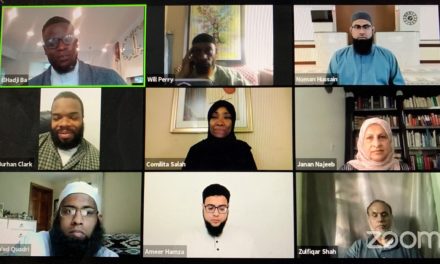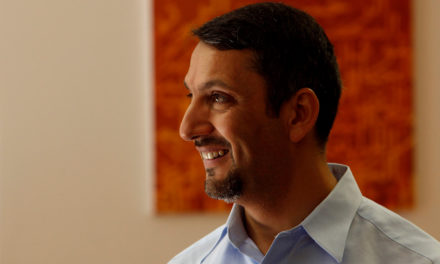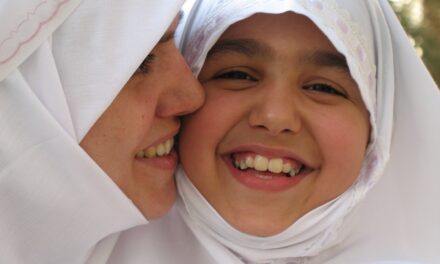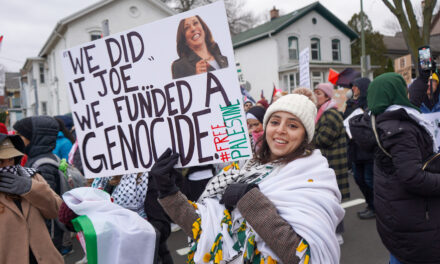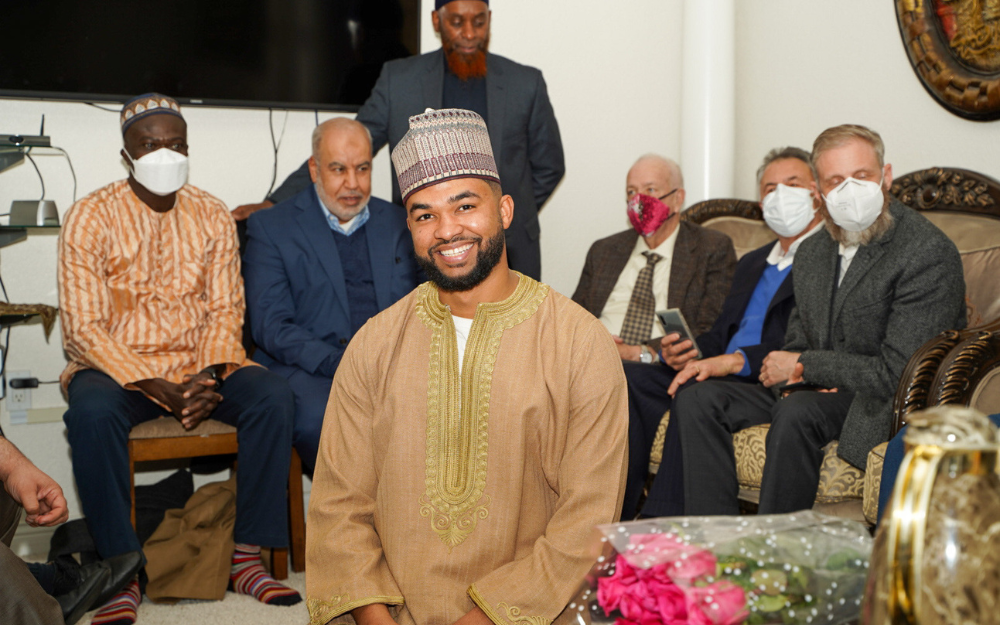
Photos courtesy of Ali Yusuf
Ali Yusuf (center) on the day of his nikkah with witnesses (back row) sheikh Zakaria, imam Ziad Hamdan, Br. Will Perry, Michael Pikuleff (grandfather), Charles Eigen (grandfather) and Jonas Wittke (cousin).
Islamic weddings consist of rituals consistent with Islamic religious requirements but often include cultural practices specific to the countries of the bride and groom or their families. For many reverts as well as second and third generation Muslims getting married, some of the customs are distinctly American, such as tuxedos for the grooms, wedding cakes and even flower girls.
In Muslim tradition, marriage is a civil contract between two people, made sacred because God is the witness. It is also a bond between the two families. In time honored tradition, the groom and his father or another family member will respectfully ask the bride’s father’s permission for his son to marry the daughter. When permission is granted, a nikkah ceremony is held in which the vows are exchanged and the contract is agreed upon, the contract has some similarity to a prenuptial agreement.
The Islamic requirement to make the nikkah valid is the absolute agreement to marriage by the bride and groom. The mahr, sometimes referred to as a dowry, is a gift the groom gives to the bride. Whether it includes the ring and other jewelry and gifts is decided by the bride and groom. Two witnesses to the marriage and contract agreement represent the groom’s side and two witnesses represent the bride’s side. A public announcement of the marriage is a large gathering of family and friends and usually includes a reception or party.
While these religious and spiritual observances constitute what defines an Islamic wedding, the diverse cultural identities of Muslims incorporate many types of music, dance, food, clothing and etiquette into these celebrations.
Wisconsin Muslim Journal interviewed Muslim grooms from four different cultures to learn how they prepare for marriage, getting insight to each custom and tradition.
Ali Yusuf, Nigeria
Ali Yusuf, who is Hausa Nigerian, got married when he was 26 years old. For him, being ready for marriage was both a matter of growth in mindset and finding the right person. Yusuf made a promise to himself that he would be married by the time he turned 28, since that was the age his father got married.
“In Islam, marriage is basically half of your faith,” Yusuf explains. “If someone never gets married, they never get the opportunity to fulfill that. I’m blessed to have found someone who I feel is my best friend.”
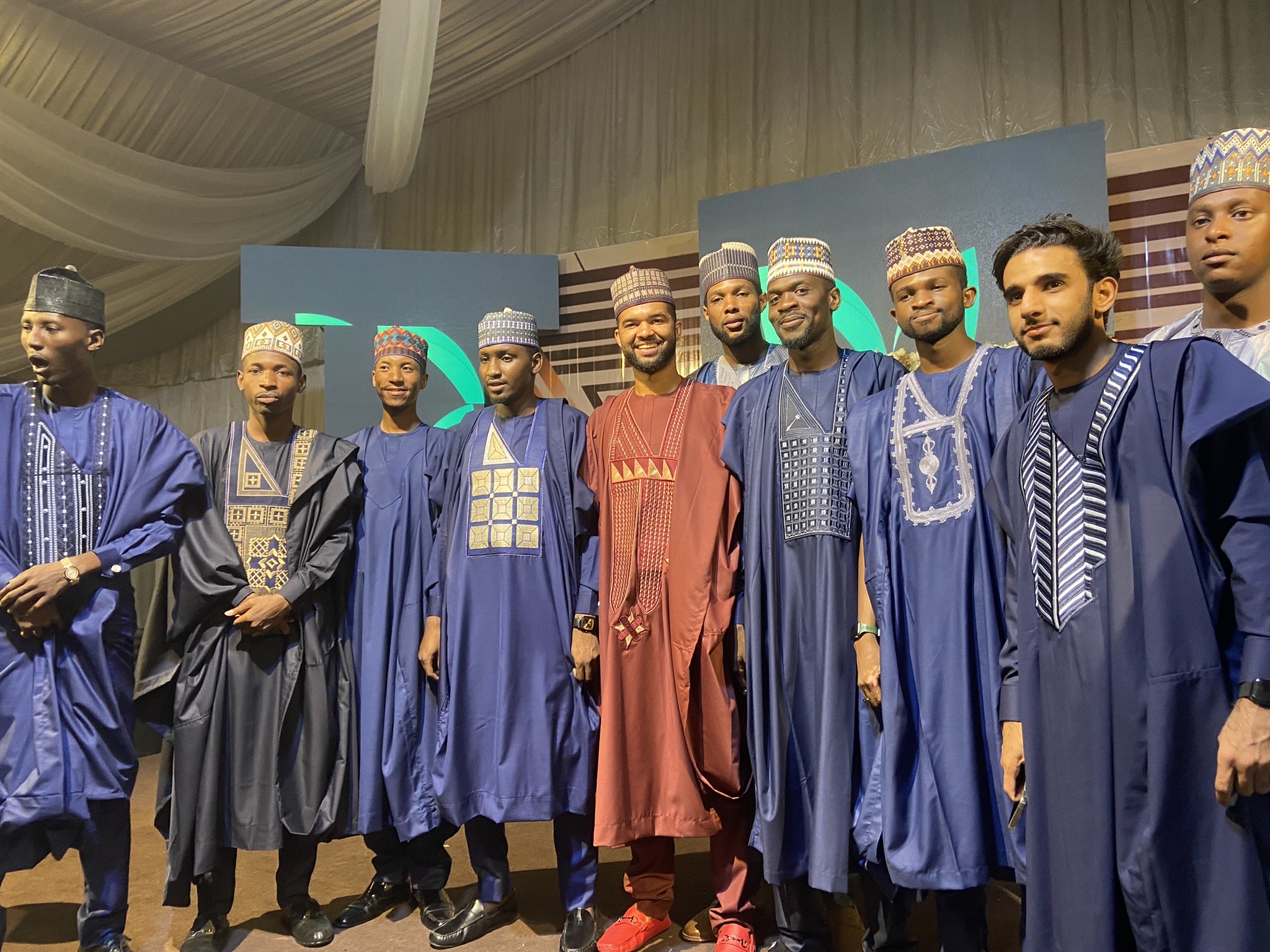
Yusuf’s (center, in oragne babban riga) celebration in Nigeria with family and friends wearing traditional wedding attire.
Yusuf’s wife is Palestinian. The couple celebrated their marriage in three public ceremonies. In both Hausa and Palestinian culture, the bride receives most of the gifts, but per Hausa custom the bride’s family typically furnishes the apartment or house according to their means.
Their first ceremony, the nikkah, took place in Milwaukee. A reception ceremony followed, also in Milwaukee, and then their third one was held in Nigeria. For each, Yusuf wore a traditional Nigerian outfit known as babban riga.
“The wedding in the U.S. was more of a traditional Palestinian celebration,” Yusuf recalls. “Usually the man’s representatives, family and friends will come to his house, and there they’ll do some drums with some singing and dancing. Then they’ll all go together to the woman’s house and do the same thing until her guardian brings her out and then you drive to the wedding.”
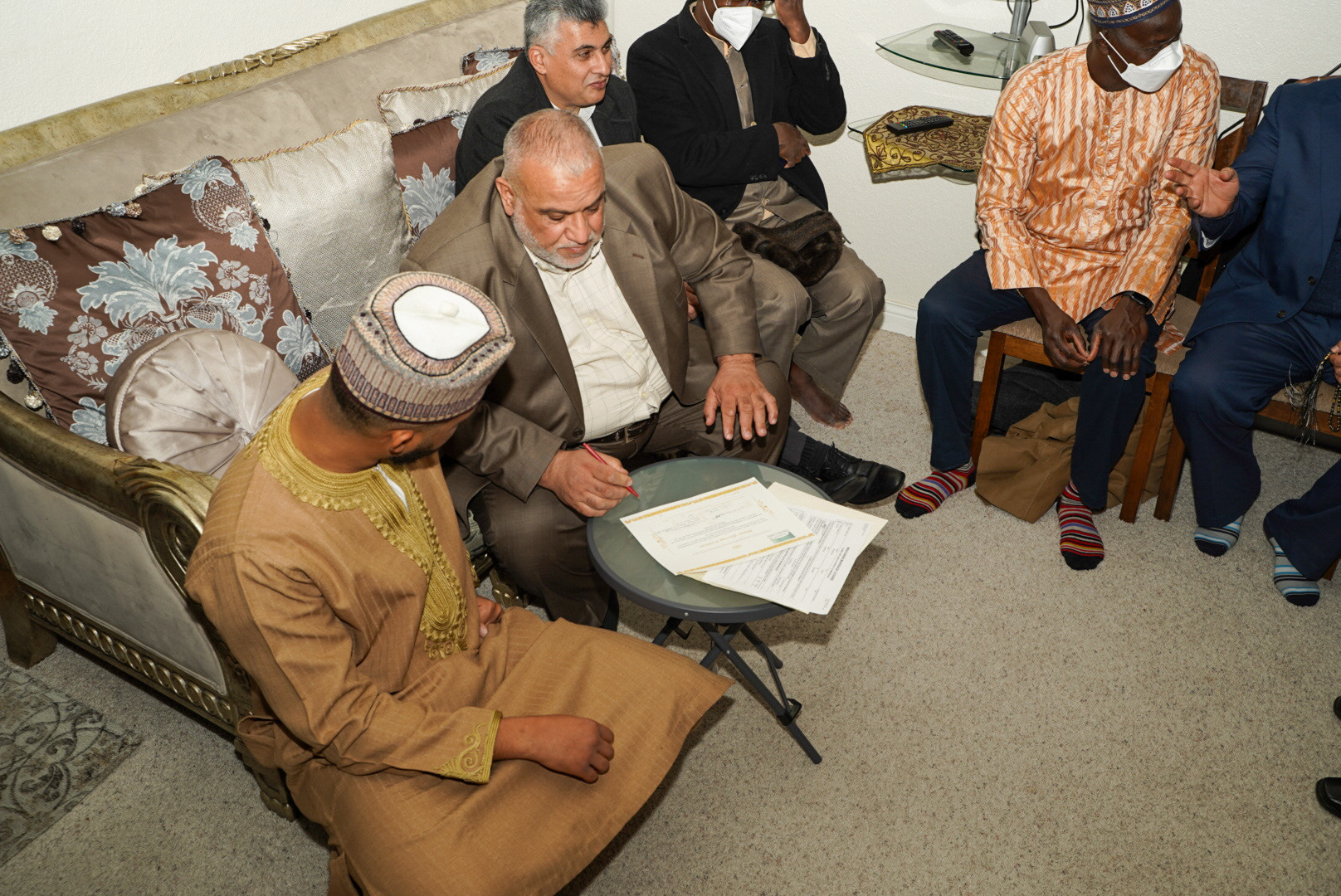
Yusuf signing marriage documents with his father-in-law.
At the U.S. ceremony, he went back and forth between the men and women’s sides, celebrating with both. Meanwhile, his wife was brought gold by guests. Dinner comprised many traditional Palestinian and Arabic dishes. Then dabke dancing and both nasheed and Afrobeat music followed.
The Nigerian ceremony was more centered around the bride. “Basically, she got brought to my house, and then all the women in the man’s house get acquainted with her,” he describes. “They hang out, eat and have some traditional music where they’re beating on these bowls that are upside-down in water in other bowls.”
Yusuf’s faith continues to teach him about being a leader and role model for his family. “If my faith isn’t as strong as it should be, then it trickles down,” he shares. “Being married has definitely helped me take on that responsibility and wanting to get closer to Allah.”
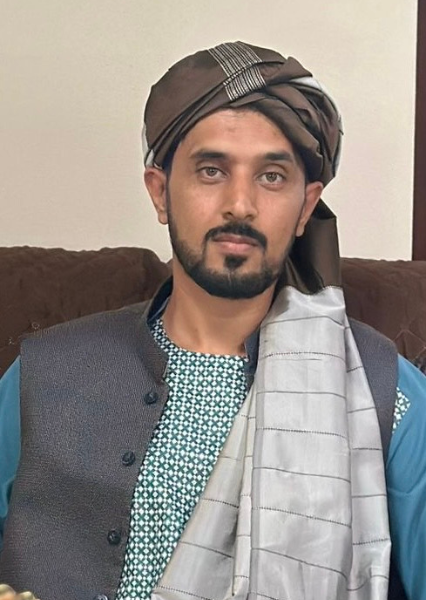
Photo courtesy of Murtaza Durrani
Murtaza Durrani wearing typical Afghani groom attire.
Murtaza Durrani, Afghanistan
Murtaza Durrani, a Pashtun Afghan man, recently got engaged in February. In his home country, arranged marriages are common, as is the case for his own. “The parents select when their son gets married, a lot of times the son is only 15 to 20,” Durrani details.
When he was younger, Durrani’s father would tell him he should get married, to which Durrani replied, “I’m not ready. I want to work. I want to get an education. I want to complete some goals and be more responsible.”
Durrani is 38 years old and has decided it is time to get married. His fiance is the daughter of someone his family has done business with. Although Durrani has lived in Milwaukee since 2021, his fiance is back home in Afghanistan. They have spent time getting to know each other online.
“I’ve needed a lot of money to get married,” Durrani laughs. “In Afghanistan, weddings are not just in a few hours – they take like one month.”
Traditional dress during weddings varies between ethnic groups in Afghanistan. The national dance of Afghanistan, attan, is often performed during wedding ceremonies.
The couple had their nikkah in Afghanistan already. They plan to have another ceremony in a third country, and then a third one here in the U.S., after which Durrani’s fiance will officially be living with him here.
When Durrani’s father spoke to his fiance’s father about the couple’s marriage, his fiance’s father said not to worry about money and to do what they wanted. “What I love about my wife’s family is, her father has a very open mind,” he adds. “It’s very hard to bring gold from Afghanistan, so I’m buying the gold and anything she wants here. So we’ve made our program simple and smaller, which is very good.”
Durrani estimates that it will take about two years before his fiance will have her visa and move to the U.S.
Nasir Hasan, Somalia
Nasir Hasan is Somalian but grew up in Ethiopia. He has been married to his wife since 2008. While in his mid 20’s, Hasan had to make crucial decisions about marriage and his career, recalling, “I was a young adult with feelings, but I hadn’t finished my educational goals yet.”
He ultimately decided to get married first. “I put my prayers to God and felt I was ready emotionally and physically,” Hasan elaborates. “If your heart settles with that decision, then you pursue.”
His wife, Samira Mahmoud, lived in Sweden for the first seven years of their marriage. “Pretty much everything was held back in Ethiopia,” Hasan continues.
For their nikkah, Samira’s family hosted Hasan’s family at their home, where Samira’s family prepared food while their imam read from the Quran, and Hasan’s family brought the dowry.

Photo courtesy of Nasir Hassan
Nasir Hasan and his wife Samira Mohamud in Milwaukee
Hasan describes Somali culture as “a combination of African and Arab styles.” The groom usually wears a traditional tunic known as a qami for the nikkah, and he will typically have a handful of friends present wearing the same garment as him. The Somali music and dance dhaanto is often performed at receptions. “Other than that, it’s not that much different from a Western wedding,” Hasan adds. “Sometimes you will see Kenyan or Ethiopian or American or Arabic music.”
In terms of gifts, guests will sometimes bring to the nikkah usable items like furniture, clothes or home decorations, while money and jewelry are more common as gifts for the reception.
Hasan remarks on what his faith continues to teach him about love and companionship, “When I go back and read our religion and history about what Muhammad did with his wives, I find that you can be a companion or lover as much as you want, but our prophet did it better. No one will wake up in the middle of the night to wash their wife’s clothes. He used to do that. 1600 years ago, he told everybody, “the best of you will be the best to your family.”
“If your kids or wife are afraid of you when you come home, then you’re not a good human being. If your kids or wife stand at the door waiting for you, then you are a good person. Love and mercy is how you raise a family. There’s no good in hate.”
Ahmed Chattha, Pakistan
For Ahmed Chattha, who is Pakistani, his older brothers modeled what he wanted for himself in terms of marriage. Recent events in Chattha’s life led him to feel emotionally and spiritually ready for it. “I have my work and my community and my family, and I went for hajj, so marriage felt like the next step in life for me,” he affirms.
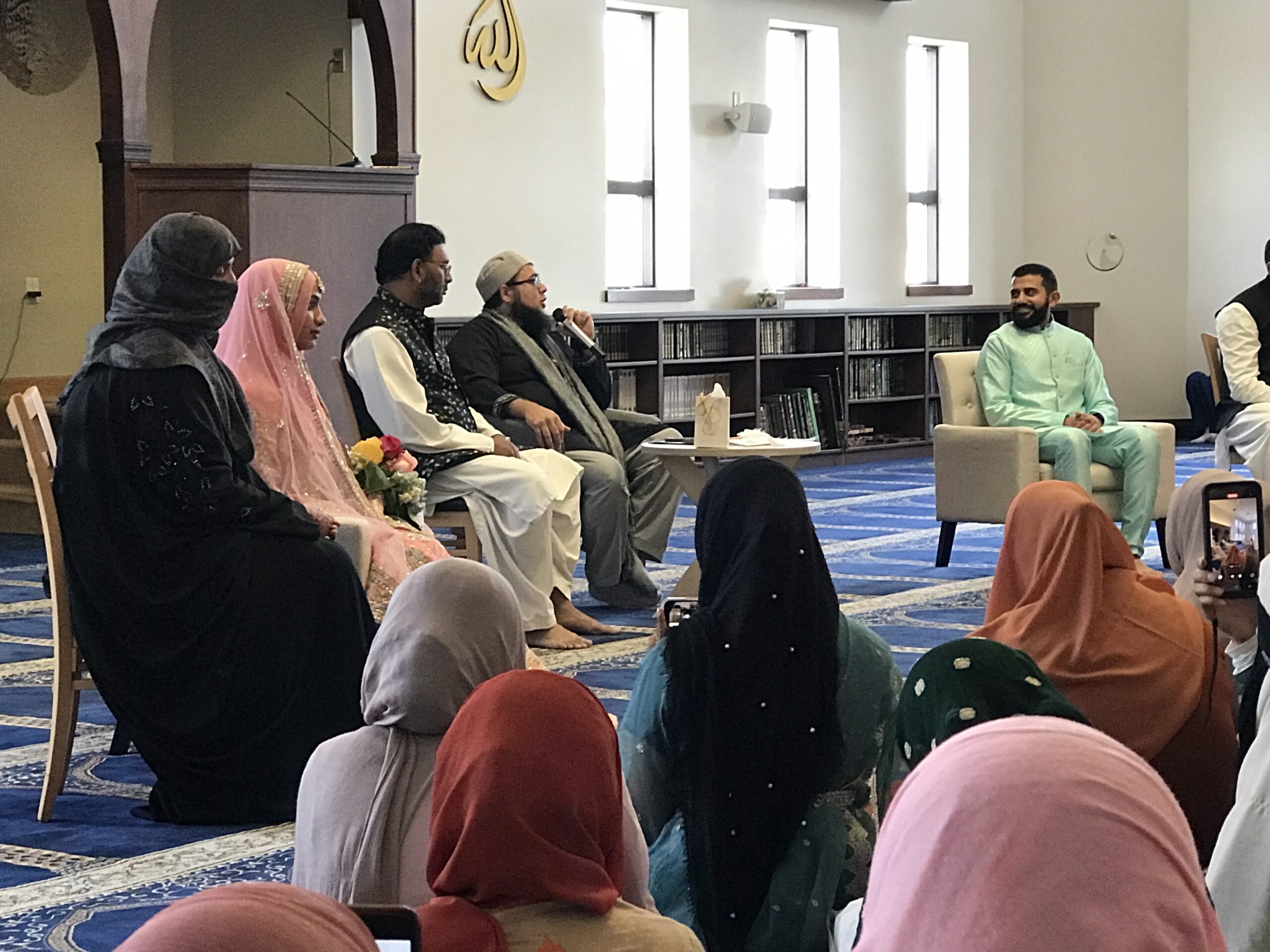
Photo by Cherrie Hanson
Imam Ameer Hamza talks about the virtue and significance of marriage at the nikkah of Ahmed Chattha and Umber Syed.
To prepare, Chattha listened to and watched many lectures about marriage on YouTube, and he frequently sought advice from Imam Amir Hamza of the Islamic Society of Milwaukee (ISM). He and his wife, Umber Syed, recently had their nikkah ceremony at ISM. “It is the place where we spend the most of our time, and where we could celebrate with all our family and friends,” Chattha explains.
The couple has two more ceremonies to do, first being the rukhsati, after which the couple begin living together. The second ceremony is the walima, which is more of a proper celebration with friends and family.
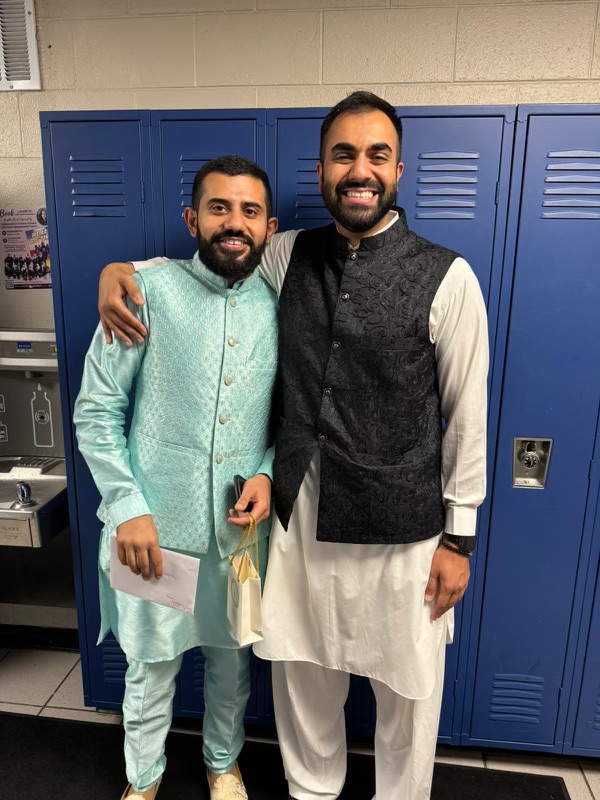
Photo courtesy of Ahmed Chattha
Ahmed Chattha’s Nikkah with his cousin Fauzan Ali
Chattha wore a sky blue shalwar kameez to his nikkah. According to him, gifts at Pakistani weddings usually come in the form of cash. “It helps recoup the wedding expenses, and just to give some money for the couple as they start this journey of life,” he mentions.
In fact, the groom writes down the names of every person who gives the couple money, as well as the amount they gave. This is done so that the couple may return the favor to them or their children at a later date, when they or their children are getting married.
Per their custom, Chattha and Syed did not have music performed at their ceremony, although they did have delicious Pakistani cuisine served for their guests.
Chattha contends that this experience has taught him much about his Islamic faith. “This world is nothing but an enjoyment for us, and the best thing that exists in this world is a good spouse. This has been the best thing in my life, and I love my wife more than anyone. I’m extremely grateful to her, to her family, to my family, to our community, and most importantly to Allah for bringing us together and making this possible for us, alhamdulillah (all praise is to Allah).”
